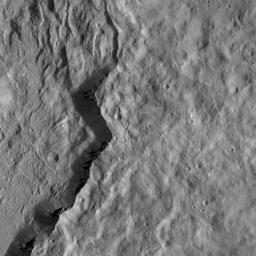
|
Dawn LAMO Image 108
- Click the image above for a larger view
- Full-Res JPEG (1024 x 1024) (159.6 kB)
- Full-Res TIFF (1024 x 1024) (1.1 MB)
Caption:
Occator Crater, home of the brightest area on Ceres, also has an intriguing rim. The jagged slopes of this 80-million-year-old basin, and linear features on its floor, contrast with the relatively smooth terrain around it, blanketed by ejecta from the ancient impact. Boulders and braided fractures are also visible along the rim.
NASA's Dawn spacecraft took this image on January 26, 2016, while its low-altitude mapping orbit, at a distance of about 240 miles (385 kilometers) above the surface. The image resolution is 120 feet (35 meters) per pixel.
Background Info:
Dawn's mission is managed by JPL for NASA's Science Mission Directorate in Washington. Dawn is a project of the directorate's Discovery Program, managed by NASA's Marshall Space Flight Center in Huntsville, Alabama. UCLA is responsible for overall Dawn mission science. Orbital ATK, Inc., in Dulles, Virginia, designed and built the spacecraft. The German Aerospace Center, the Max Planck Institute for Solar System Research, the Italian Space Agency and the Italian National Astrophysical Institute are international partners on the mission team. For a complete list of acknowledgments, see http://dawn.jpl.nasa.gov/mission .
For more information about the Dawn mission, visit http://dawn.jpl.nasa.gov .
Cataloging Keywords:
| Name | Value | Additional Values |
|---|---|---|
| Target | 1 Ceres | |
| System | Main Belt | |
| Target Type | Dwarf Planet | Asteroid |
| Mission | Dawn | |
| Instrument Host | Dawn | |
| Host Type | Orbiter | |
| Instrument | Framing Camera (FC) | |
| Detector | ||
| Extra Keywords | Crater, Grayscale, Impact | |
| Acquisition Date | ||
| Release Date | 2016-06-13 | |
| Date in Caption | 2016-01-26 | |
| Image Credit | NASA/JPL-Caltech/UCLA/MPS/DLR/IDA | |
| Source | photojournal.jpl.nasa.gov/catalog/PIA20648 | |
| Identifier | PIA20648 | |
